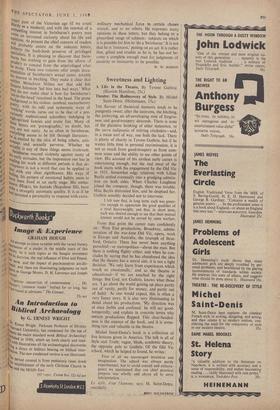Sweetness and Lighting
A Life in the Theatre. By Tyrone Guthrie. (Hamish Hamilton, 25s.) Theatre: The Rediscovery of Style. By Michel Saint-Denis. (Heinemann, 15s.) THE flavour of theatrical memoirs tends to be pungently sweet; after the tantrums, the bitching, the jockeying, an all-enveloping mist of forgive- ness and good-troupery descends. There is none of the plaintive honking of elder statesmen, or the saeva indignatio of retiring cricketers—and, in a mean sort of way, one feels the lack. There is plenty of charity in Tyrone Guthrie, but if he wastes little time in personal recrimination, it is not so much from good-troupery as from com- mon sense and the ability to see other points of view. His account of his aimless early career is entertaining enough, but the real meat of the book starts with his engagement by the Old Vic in 1933. Somewhat edgy relations with Lilian Baylis settled eventually into a grudging admira- tion on both sides. When Charles Laughton joined the company, though, there was trouble. Miss Baylis distrusted him, and he despised her. Guthrie sensibly decided not to intervene.
I felt sure that, in long term, each was gener- ous enough to appreciate the good qualities of a rival heavyweight; and that, in short term, each was shrewd enough to see that their mutual interest would not be served by open warfare.
From that point the career runs confidently on : West End productions, Broadway, admin- istration of the war-time Old Vic, opera, work in Europe and Australia, the triumph of Strat- ford, Ontario. There has never been anything parochial—or metropolitan—about the man. But there is nothing flighty either, and when he con- cludes by saying that he has abandoned the idea that the theatre has a moral aim, it is not a light decision. 'We only learn from experiences which touch us emotionally,' and so the theatre .is educational—if we are touched by the right things. But God, not Guthrie, knows what those are. 'I go about the world getting up plays partly out of vanity, partly for money, and partly out of habit.' As one would expect, this is often a very funny story. It is also very illuminating in detail about his productions. 'My direction was at once feeble and confused,' he will say good- temperedly, and explain in concrete terms why certain productions flopped. This clear-headed- ness is the essence of the book, and it is some- thing rare and valuable in the theatre.
Michel Saint-Denis's book is a collection of five lectures given in America. The talk is all of Style and Truth; vague, bleak, academic theory, the opposite pole to Guthrie. Of the Old Vic school, which he helped to found, he writes: First of all we encouraged invention and imagination. The school was always partly experimental; but to avoid conceit and extrava- gance we maintained that our chief practical purpose was wholly and above all to serve interpretation. . . .
Le style, c'est l'honone, says M. Saint-Denis, suicidally.
JOHN HOLMSTROM


































 Previous page
Previous page